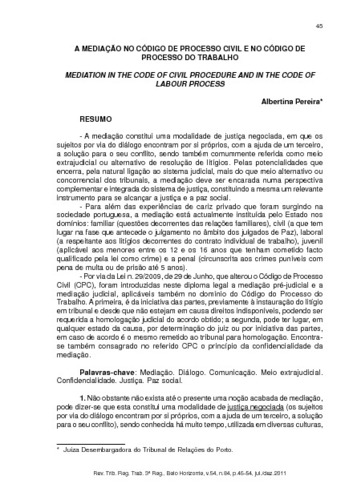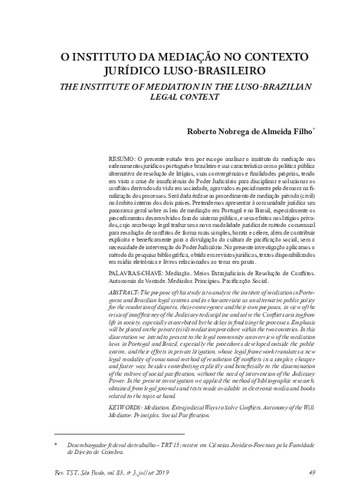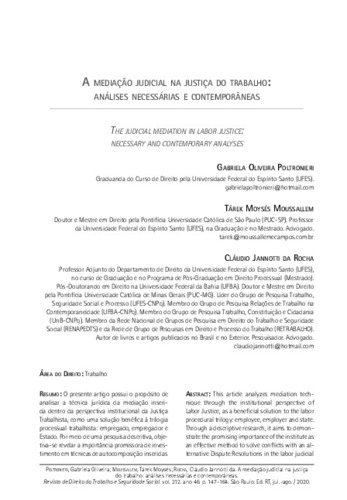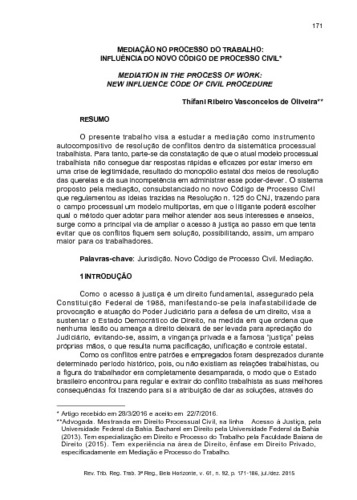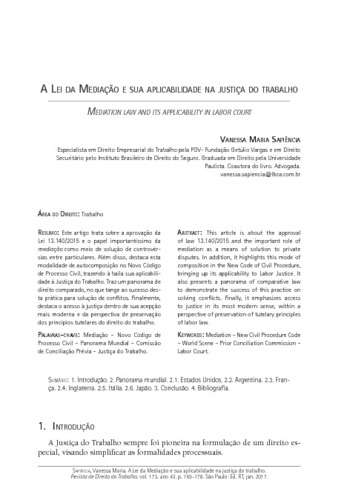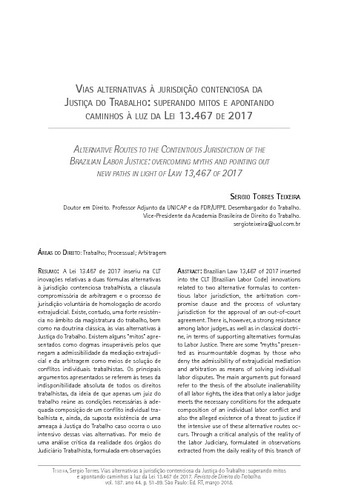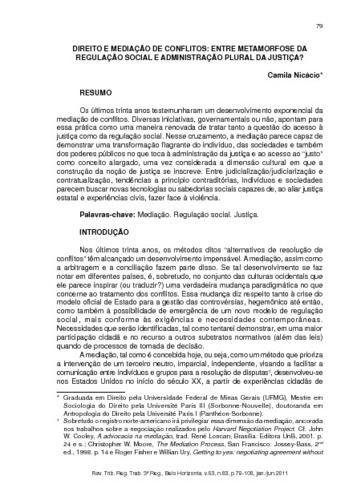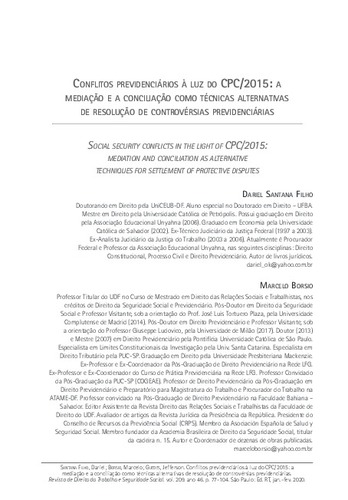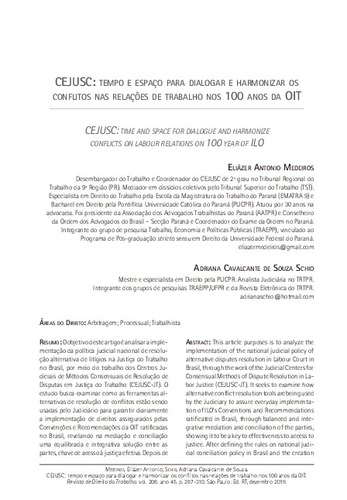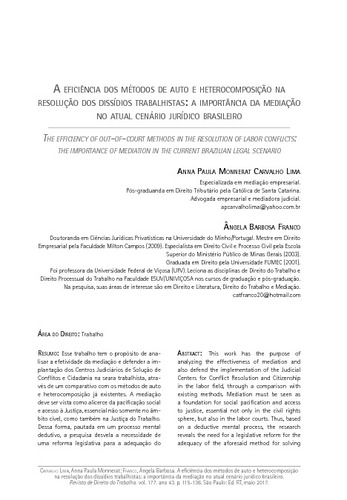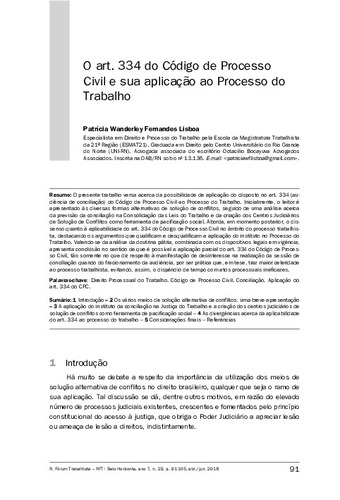Artigo de periódico
A mediação no Código de processo civil e no Código de processo do trabalho
| dc.contributor.author | Pereira, Albertina | |
| dc.date.accessioned | 2015-12-14T13:41:46Z | |
| dc.date.available | 2015-12-14T13:41:46Z | |
| dc.date.issued | 2011-12 | |
| dc.identifier.citation | PEREIRA, Albertina. A mediação no Código de processo civil e no Código de processo do trabalho = Mediation in the Code of civil procedure and the Code of labour process. Revista do Tribunal Regional do Trabalho da 3ª Região, Belo Horizonte, v. 54, n. 84, p. 45-54, jul./dez. 2011. | pt_BR |
| dc.identifier.uri | https://hdl.handle.net/20.500.12178/74730 | |
| dc.description.abstract | [por] A mediação constitui uma modalidade de justiça negociada, em que os sujeitos por via do diálogo encontram por si próprios, com a ajuda de um terceiro, a solução para o seu conflito, sendo também comumente referida como meio extrajudicial ou alternativo de resolução de litígios. Pelas potencialidades que encerra, pela natural ligação ao sistema judicial, mais do que meio alternativo ou concorrencial dos tribunais, a mediação deve ser encarada numa perspectiva complementar e integrada do sistema de justiça, constituindo a mesma um relevante instrumento para se alcançar a justiça e a paz social. - Para além das experiências de cariz privado que foram surgindo na sociedade portuguesa, a mediação está actualmente instituída pelo Estado nos domínios: familiar (questões decorrentes das relações familiares), civil (a que tem lugar na fase que antecede o julgamento no âmbito dos julgados de Paz), laboral (a respeitante aos litígios decorrentes do contrato individual de trabalho), juvenil (aplicável aos menores entre os 12 e os 16 anos que tenham cometido facto qualificado pela lei como crime) e a penal (circunscrita aos crimes puníveis com pena de multa ou de prisão até 5 anos). - Por via da Lei n. 29/2009, de 29 de Junho, que alterou o Código de Processo Civil (CPC), foram introduzidas neste diploma legal a mediação pré-judicial e a mediação judicial, aplicáveis também no domínio do Código do Processo do Trabalho. A primeira, é da iniciativa das partes, previamente à instauração do litígio em tribunal e desde que não estejam em causa direitos indisponíveis, podendo ser requerida a homologação judicial do acordo obtido; a segunda, pode ter lugar, em qualquer estado da causa, por determinação do juiz ou por iniciativa das partes, em caso de acordo é o mesmo remetido ao tribunal para homologação. encontra-se também consagrado no referido CPC o princípio da confidencialidade da mediação. | pt_BR |
| dc.description.abstract | [eng] The mediation constitutes a modality of negotiated justice, in which the subjects through dialogue found by themselves, with the help of a third party, the solution to their conflict, being commonly referred to as alternative or extrajudicial mean of resolution of conflicts. By the potentialities which contents, by the natural connection to the judicial system, rather than competitive or alternative means of the courts the mediation should be seen in a complementary and integrated justice system, constituting the same as an important tool to achieve justice and social peace. - Beyond the private nature of experiences that have emerged in the Portuguese society the mediation is presently established by the State in the areas: family (issues arising from family relations), civil (which takes place in the previous phase of the judgment in the ambit of the Justices of the Peace), labor (concerning to litigations arising from the individual employment contract), juvenile (applied to minors between 12 and 16 years who have committed fact qualified as crime by law) and criminal (limited to offenses punishable with fine or imprisonment up to 5 years). - Through the Law 29/2009, of June 29, which amended the Code of Civil Procedure (CPC), was introduced in this legal diploma the pre-court mediation and the judicial mediation, also applicable in the field of the Labour Procedure Code. The first, is of the initiative of the parties, prior to the commencement of the litigation in court and provided they are not in question inalienable rights, and may be requested judicial homologation of the agreement reached; the second, can take place in any state of the cause, by determination of the judge or by the initiative of the parties, in case of agreement is the same remitted to the court for homologation. It is also consecrated in the referred CPC the principle of the confidentiality of the mediation. | pt_BR |
| dc.language.iso | pt_BR | pt_BR |
| dc.relation.ispartof | Revista do Tribunal Regional do Trabalho da 3ª Região: vol. 54, n. 84 (jul./dez. 2011) | pt_BR |
| dc.subject | Processo trabalhista, legislação, alteração, Portugal | pt_BR |
| dc.subject | Processo civil, legislação, alteração, Portugal | pt_BR |
| dc.subject | Acesso à justiça, Portugal | pt_BR |
| dc.subject | Mediação (processo civil), legislação, Portugal | pt_BR |
| dc.title | A mediação no Código de processo civil e no Código de processo do trabalho | pt_BR |
| dc.title.alternative | Mediation in the Code of civil procedure and the Code of labour process | pt_BR |
| dc.type.genre | Artigo de periódico | pt_BR |
| dc.identifier.rvbisys | 000969011 | |
| dc.relation.ispartoflink | https://hdl.handle.net/20.500.12178/72689 | pt_BR |
Coleção
-
Artigos9497


